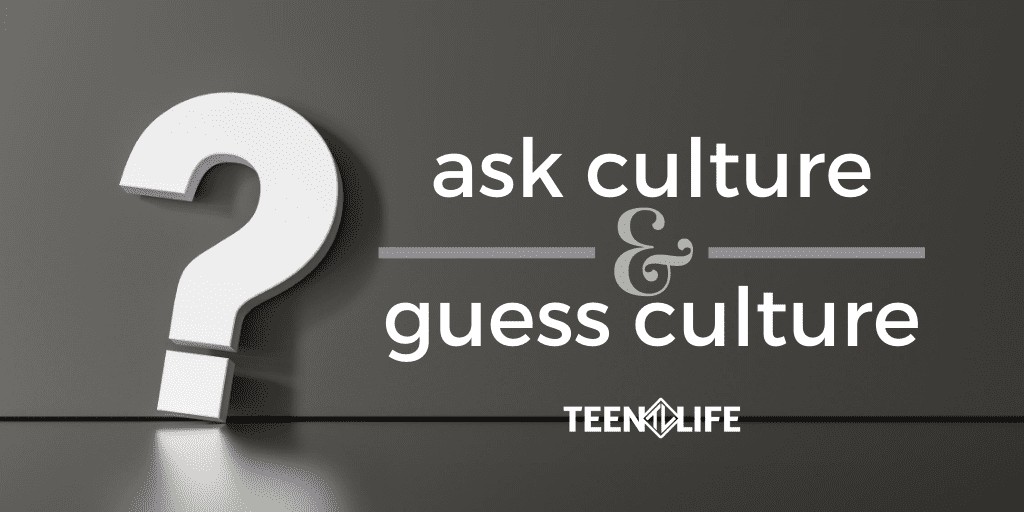I was scrolling through a Facebook group recently and one of the members shared this Tumbler post. For the original post the author is referencing, see here. To summarize the post, someone who lives in New York has a friend asking to stay in his home. The first time he and his wife had a ready excuse. The second time, he’s asking for advice on how to say no to the request, and essentially what would be the nuances of rudeness in a direct NO versus another excuse.
There are the predictable myriad of comments ranging from “How could she?” to “What’s wrong with asking? Just say no.” One of my favorite comments is, “If you need an excuse, tell her you’re going out of town. If you need an honest excuse, go out of town.” Who actually goes out of town to avoid saying no?
Until one reader leaves this comment:
This is a classic case of Ask Culture meets Guess Culture.
In some families, you grow up with the expectation that it’s OK to ask for anything at all, but you gotta realize you might get no for an answer. This is Ask Culture.
In Guess Culture, you avoid putting a request into words unless you’re pretty sure the answer will be yes. Guess Culture depends on a tight net of shared expectations. A key skill is putting out delicate feelers. If you do this with enough subtlety, you won’t even have to make the request directly; you’ll get an offer. Even then, the offer may be genuine or pro forma; it takes yet more skill and delicacy to discern whether you should accept.
All kinds of problems spring up around the edges. If you’re a Guess Culture person — and you obviously are — then unwelcome requests from Ask Culture people seem presumptuous and out of line, and you’re likely to feel angry, uncomfortable, and manipulated.
If you’re an Ask Culture person, Guess Culture behavior can seem incomprehensible, inconsistent, and rife with passive aggression.
Obviously she’s an Ask and you’re a Guess. (I’m a Guess too. Let me tell you, it’s great for, say, reading nuanced and subtle novels; not so great for, say, dating and getting raises.
Thing is, Guess behaviors only work among a subset of other Guess people — ones who share a fairly specific set of expectations and signaling techniques. The farther you get from your own family and friends and subculture, the more you’ll have to embrace Ask behavior. Otherwise you’ll spend your life in a cloud of mild outrage at (pace Moomin fans) the Cluelessness of Everyone.
As you read through the responses to this question, you can easily see who the Guess and the Ask commenters are. It’s an interesting exercise.
Mic drop.
The concept of Ask Culture and Guess Culture really struck a chord with me.
I have spent the vast majority of my life as a Guess. As a teenager, I very rarely conflicted with anyone, because I avoided all conversations that might result in a no or any other kind of conflict. My parents called me the “easy child.” Other parents praised them for my obedience. I lived with a low level of very well-concealed anxiety that had me taking prescription medications to calm my stomach for a period of time. Everyone blamed school and stress.
In hindsight though, in the context of this comment, I believe that a fair share of that internalized stress was a fear of risk. A fear of the unknown, of failure, of a NO.
My father used to say, “What’s the harm in trying? The worst that can happen is they say no.” And logically, I knew it was truth. But emotionally, it was terrifying.
The commenter is right. The farther I wandered from home, the more I was forced to learn to interact as an Ask, but it is a conscious decision every time. In my heart of hearts, I’d really rather wait until the answer is 99% Yes before we talk about it. The only real exception is when advocating for others. Somehow asking is easier when it doesn’t feel selfish, right?
As a parent, I’m with my dad. I want my kids to ask fearlessly and not to dwell on the No’s when they happen. I want every question to be valid and heard, even when it doesn’t produce the desired result. And even then, the balance between bulldozer and fearless self-advocate is essential. I don’t really want kids who ask for forgiveness instead of asking for permission. Ask respectfully, but ask away!
So moving forward with this new awareness of the two ways to view the world, I’m hoping to be more intentional about fostering an Ask Culture in my home, by validating and honoring requests, even when the answer is No. As a Guess though, I’m suddenly aware of what I’m modeling. Am I being overly cautious or am I just being polite?
What about your experience and Culture? Are you an Ask or a Guess? Is your spouse the same? Are your kids the same? How does it affect your household interactions? How does it affect your teens in school?
Tell me in the comments. I’m fascinated and I want to hear more!

Kelly Fann
Digital Media Manager

This really strikes a chord with me for about a dozen reasons. I’m really trying to be cross-generational but mostly find I’m not ‘talking’ the right language. This brief note helps me understand where my concept(s) paint me into my own little world.
I can think of scriptures on both sides; depending on your view (relationship) of God, you can find one that supports your point of view.
What I want is more understanding…..
Seeking understanding is always a great beginning to a real conversation!
I’m an asker and my wife is a guesser. I’m really try to wrap my head around when, if ever, it is actually acceptable to be a guesser.
I can see why you would ask that. Having lived in a few different cultures, I’m pretty sure there are askers and guessers no matter what circles you move in. The strongest guess culture I’ve seen is white southern women where being an asker is often perceived as either desperate or brash (or both). I’m not sure that makes it acceptable overall or not, but I lean toward thinking there’s not a right or wrong here. They are just two different ways of communicating. For me, it was extremely useful to realize that I had been raised a guesser. It explained a lot of asker behavior for me.
There’s an article out now on an autistic communication style that I suspect is the way a natural “guessing” communication style manifests in a person when that person is autistic.
https://neuroclastic.com/2021/04/05/weavers-and-concluders-two-communication-styles-no-one-knows-exist/
I’m not sure how I would describe the neurotypical “guesser” mindset metaphorically (I would maybe kind of say like blowing bubbles around or something) but the autistic form of guess communication is aptly described as weaving a tapestry.
That is fascinating! I definitely think there are parallels.
I wonder though if most “guessers” at their core are trying to understand a subject without giving away too much of themselves though- without risking anything or as little as possible. They are blowing bubbles around a topic, as you put it so eloquently, in order to avoid breaking trust with that person. That isn’t quite the way “weavers” are described. “Weavers” are, in a sense, revealing and risking with each comment to create trust and connection. Maybe “weavers” are building, while “guessers” are guarding? I might be reading that wrong. Thoughts?